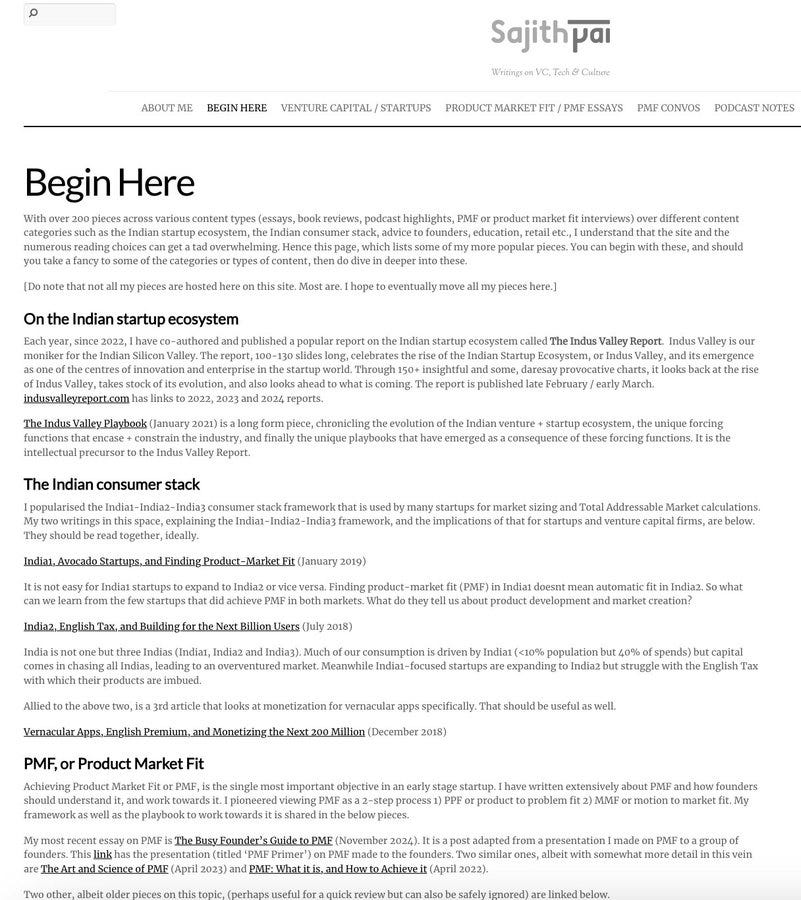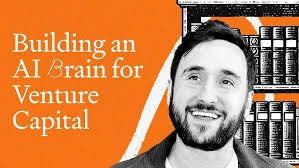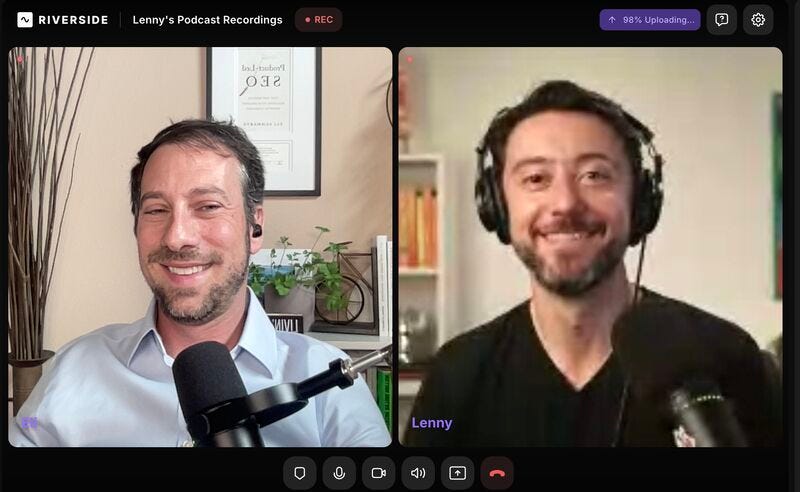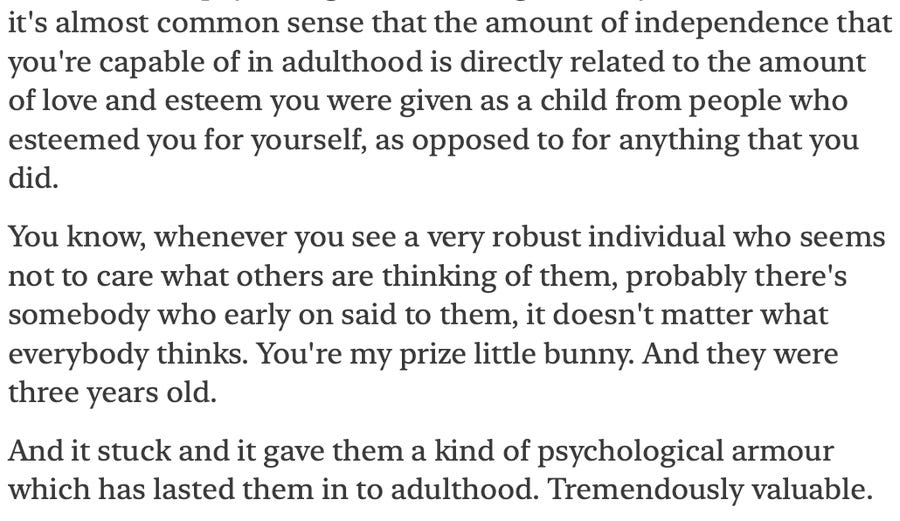PMF, Cold Mails, Psychological Armour, and Softbank
Sajith Pai's usually irregular newsletter #30
Welcome to the 30th edition of my irregular newsletter. Since the last newsletter, published just over a month back, we saw 400+ new subscribers sign up for the newsletter. Welcome aboard my news subscribers, and enjoy your first newsletter.
Quick housekeeping announcements for the new subscribers. The newsletter has two permanent sections: Writings - where I usually write and / or refer to one or more original pieces that I published in the previous months, typically about venture or the startup ecosystem, and Readings - about what I read and learnt about. My reading diet is tilted rather heavily in favour of books and podcast transcripts, and against articles / newsletters. This will naturally reflect in the reading list.
This is a long newsletter - think of it as akin to a monthly magazine from me (only the frequency may not be monthly!). I don’t know if you can read this entire newsletter (and peruse the links) in one sitting, and even if you do a second run ( which I very much doubt), you will have to pick and choose what to focus on. A good way to read this newsletter is to certainly read my original writing(s) below, and then glance through the rest and pick 1-2-3 items that pique your interest. Anything more is a bonus!
Writings
1/ AI and Cold Emails
When I entered venture, I was made aware that this is a service business, and that founders are who we serve. I made a promise that I would respond to every 1:1 (cold) mail from a founder. After all it is her or his life's work, and a reply is the least I can do.
But 6 years on, I think it is nearing the point where I need to rethink my practice of replying to every cold email, as (some) founders run AI-generated automated campaigns (See example below). The number of these types of inbounds is rising.
Am sure I am not the only VC who is at the receiving end of these campaigns (Andrew Chen is too, as you can see below!). But the long-term consequences of these campaigns is that more and more VCs will increasingly shy off from replying to cold mails and respond only to referrals. Many VCs already respond only to referrals. These campaigns will push more of us, including folks like me who try to respond to most cold emails, into that group.
Source: Twitter / X
One interesting point made by Anna Gat in a recent podcast with Dwarkesh Patel (this time he was the guest) was how she categorises cold mail that specifically is written for her on the basis of the length. The shorter the mail the more likely the author has written it only to her. The longer the message the more likely it is AI-generated (or at least created for sending to more people) and the more likely that the author will be sending it to many other folks as well. Interesting.
On the topic of cold emails, this one from Sriram Krishnan is gold.
Finally, this is an excellent example of an effective cold email
Source: Twitter / X
2/ PMF = PPF + MMF
Achieving Product Market Fit or PMF, is the single most important objective in an early stage startup. I have written extensively about PMF and how founders should understand it, and work towards it. I view PMF as a 2-step process 1) PPF or product to problem fit 2) MMF or motion to market fit. My framework as well as the playbook to work towards it is shared in a piece I recently wrote: The Busy Founder’s Guide to PMF. It is a post adapted from a presentation I made on PMF to Antler India’s Residency program founders in Sep’24.
This link has the presentation (titled ‘PMF Primer’) on PMF that I made to the founders.
3/ PMF Convo #19: Romita Mazumdar, Foxtale
In my latest PMF Convo interview, I spoke to Romita Mazumdar, founder & CEO of beauty products co Foxtale. Romita is a VC analyst turned founder, who started Foxtale during the COVID-19 pandemic, speaking to 900+ women and 100+ brands to figure out the specific sub-problem she wanted to attack in the beauty space. Foxtale is one of the fastest-growing digital-first consumer brands and this convo gave me a perspective into the key drivers of that growth. Romita’s deep understanding of the space as a user, backed by hundreds of conversations, an open mind, and innovative approaches to marketing, come alive in the chat.
In my post (the transcript is linked to in the post) we cover the limited SKU strategy Foxtale follows, how she tracks early PMF, and susses out if the product needs backing, how she divides products into acquisitory and hero products, and why founders need to score high on one of self-belief, passion or obsession (or obstinacy!). This was an enlightening conversation. Romita is an impressive young founder and it is scarily impressive how much she has achieved.
Link to the highlights and transcript of the PMF Convo with Romita Mazumdar.
4/ My ‘greatest hits’
I create a new page on my personal site titled ‘Begin here’, listing 20+ popular pieces / writings that form a good introduction to my oeuvre. I did this in response to a young reader complaining that the site seemed "overwhelming" and he "didn't know where to start".
My pieces (for those unfamiliar with my oeuvre) cover the Indian startup scene, the Indian consumer stack (including the India123 framework), the venture industry, PMF & other inputs to founders, and other miscellany. I started writing in 2012. There were no readers or visitors to the site for years. Crossposting on LinkedIn, which I started doing in 2015, and later on Medium (though I have discontinued there) helped, though I continue to publish on the site as a backup. Now there are 200+ pieces on the site. It is a testment to being consistent, at least of a kind - my consistence has reduced from ~2 pieces a month for a long while and now down to likely one every 2 months, buyt I never stopped publishing!
I find it interesting that my first big hit on the rise of the Indo-Anglians (english speaking households in India) was my 90th article. There were some minor hits before but that 90th was my first viral hit (with a lot of criticism on the interwebs etc.,). Patience, young 'uns, patience!
Readings
Podcasts are in reading because I mostly read transcripts (versus listening). I know, I know!
Podcasts
Speaking of podcasts, I made an appearance on Infinite Loops podcast. Hosted by Jim O’Shaughnessy (this is Colossus’s Patrick O’Shaughnessy’s dad) it has an eclectic collection of guests reflecting Jim’s intensely curious mind.
In the podcast I unpack the Indian startup ecosystem and the Indian growth opportunity from the vantage point of an early stage investor. Anyone looking to invest in the India opportunity and understand India will find this useful!
Here is the link to the podcast episode + transcript. This page also has a list of my writings that struck a chord with Jim; it is a sort of ‘the best of Sajith Pai’ (like by ‘Begin here’ page linked above), and gives you a sense of the range of my writing.
A/ Matt Cynamon, USV, on AI + I with Dan Shipper
30 October 2024. Link to podcast and transcript. Link to my notes / highlights.
One of the more interesting podcast interviews I have consumed in the past months / year. Matt Cynamon the 'Head of Library Sciences' at Union Square Ventures comes on the AI + I podcast with Dan Shipper to talk about all the cool AI stuff they are cooking up at Union Square Ventures (USV).
You may have seen the OH (overheard) on the USV Librarian account @usvlibrarian on Twitter. That was built by him. Over 70 mins he takes us through the GenAI stuff they are building at USV, detailing cool tools such as
- The Librarian: all the 15k articles they have written at USV which can be queried) [14:30 - 23:00 mins of the podcast]
- Meeting Notes - OH [45:00mins onwards]
- The Dream Machine [1:03 onwards] - this is v trippy...AI-generated images to sync with conversation topics - loved the whales and cats imagery!
Am sure some other VC funds have some of these built (Yohei Nakajima comes to mind), but USV is of course one of the giants of venture. Impressed with the suite of tools that USV has built out, and grateful that they and Matt have been more public about it.
A couple of interesting points that emerged from the podcast episode
* Matt says that the cost of creating good storytelling is dropping. (AI is still not ready for releasing content without final review and polish and even some rewriting, but it gets you to 60-70% of the content very fast). Hence, he says that AI can help you tell stories about things you wouldn’t create stories about, like internal meetings. There is a ton of content getting created that is not getting captured and AI can help you capture and make that content in a ready to consumer format.
* Matt: “The market for purely AI-generated content is the size of your biggest group chat.”
My take on the above two points is that as creation gets democratized and the cost of creating drops, the importance of curation and distribution become more and more important. Having content that is uniquely about your opinion or taste, and looks like / reads like content that AI couldn’t have generated (or at least without distinct prompts) begins to matter.
Content could be meta-content like The Dream Machine that he demos in the episode - AI-generated images that emerge in real time to words spoken in a conversation - as content generation gets cheaper, new content formats could be meta ideas for content generation by GPTs, like a meta content idea for creating fake but seemingly real countries in the layout of wikipedia etc.
B/ Eli Schwartz, SEO guru, on the Lenny Rachitsky Podcast
19 September 2024. Link to podcast + transcript. Link to my notes / highlights.
Sajith: Loong episode at nearly 2 hours, but worth a watch for any founder / operator wrestling with SEO or content. Eli Schwartz is one of the foremost thinkers in the SEO space today, author of the book ‘Product-Led SEO’ and advisor to Zapier, Tinder, LinkedIn etc. He speaks to Lenny on a wide range of topics related to SEO.
2 key themes in the podcast that stood out to me:
He covers how AI / LLMs will impact search / SEO. Effectively the top of the funnel will now be owned by Google and LLMs - so content like 20 best beach hotels in Southern Europe will now either get aggregated into AI Overviews (top hit on Google Search) or within LLMs with occasional citations, and your site will get pushed further downward. Hence the best SEO content will move midfunnel and have content that is helpful to drive conversions. This is how SEO should have been from the beginning but because it is hard to measure conversion, and harder with SEO, and relatively easier to show rankings impact, SEO got positioned as Top of Funnel.
The other metapoint that Eli makes is around whether you need SEO at all. Not everyone has to do SEO he says. It is best used in contexts where the customer is aware of the problem, uses specific keywords or language to understand the problem or look for a solution, and this behaviour arises naturally in the user / customer journey of addressing the problem. User Journeys is a term which comes frequently in the podcast episode, and effectively Eli is saying that if searching for content is not helpful for the user in solving the problem / and not relevant for you in driving conversion, then you don’t need SEO. Too many companies default to doing SEO because yi have raised money and you need to spend on SEO. This is wrong he says. It is expensive when you add up all of the cost of creating the content and hiring the experts. You need to consider the ROI of the investment actively like you do with Paid Marketing, but not enough companies do that he says. In his perspective, most sales-led / top-down SaaS motions can eschew their investments in SEO. It is more relevant for PLG motions like Zapier, Notion etc.
C/ Nikita Bier, teen social app guru, on the Lenny Rachitsky podcast
25 August 2024. Link to episode + transcript page.
This is a particularly good episode for consumer social app founders. Nikita Bier is well-known for having created viral teen social apps such as TBD, Gas (acquired by Meta, and Discord, respectively). This episode is interesting for his insight on why why consumer social products (that are optimising for virality) should first build for teens / use that segment as a wedge (because sharing / experimentation with new apps drops sharply after your late teens). This was fascinating.
D/ Alain De Botton, on 20VC, w Harry Stebbings
18 November 2024. Link to episode page. Link to my notes + highlights of the episode.
I thought this was an exceptional episode. Alain De Botton is a very intriguing guest for a tech podcast, but I am glad Harry did it and was able to pull it off. I read Alain De Botton’s romantic novels when I was in my 20s and enjoyed them hugely. Later he evolved into a (pop) philosopher of a kind and I kind of lost touch with his writing. I am now tempted to dip into his philosophical writing given this episode. What stands out here is his insight into the psychology of parenting, the parent-child dynamics, and the psychology of the workplace. That one line (see first para in the ‘Advice to parents’ section) where he encourages you to praise or esteem your child for what they are vs for what they did, and you will give them psychological armour for adulthood, was the biggest takeaway of the episode for me.
E/ Parker Gilbert, Numeric, on the PMF Show w Pablo Srugo
31 October 2024. Link to episode + transcript page. Link to my notes + highlights of the episode.
I liked this episode (and the series too, given it is devoted to PMF or Product Market Fit) for the intentional, frugal way in which the founder built the startup following the speedy preseed / seed raise. He was laser-focused on getting to PMF and in that pursuit, kept the team small, didn’t sell annual subs (as he felt restricting it to montly subs, would give a faster signal of churn, and would make the team be more responsive) and made sure they charged from day one (as that gave them a clear idea of what value they were offering the customer). Lots to learn for any co, but especially B2B SaaS companies from this case study / episode.
Podcast recommendation: The Joe Walker Podcast
If you like the Dwarkesh Patel podcast but cant get enough of it, and are looking for something similar (deep intellectual convos), then i would like to point you to the Joe Walker Podcast by Joseph Walker.
The podcast guests are an eclectic bunch of thinkers - academics / scientists to politicians! (He interviewed Nobel winner Katelin Kariko well before the Nobel award.)
When I encountered it first, it was titled rather memorably as the Jolly Swagman podcast. Sadly it is now the rather plainly named Joe Walker podcast. But the content is very much in the same vein as before. Joe Walker conducts deep intellectually stimulating conversations (prefaced by some ferocious prepwork) with an eclectic bunch of thinkers - academics and scientists such as nobel laureates Katelin Kariko (this before her Nobel) and Frank Wilczek to intellectuals such as Stephen Wolfram and Nassim Taleb. Like Dwarkesh Patel, Joe Walker is a professional learner in the guise of a podcast host.
An episode of his I particularly enjoyed, and recommend, was this discussion with Shruti Rajagopalan (especially her dissection of the ‘Basic Structure’ doctrine of the Indian Supreme Court).
Articles
Technology and Grieving, by Ranjan Roy
I cried reading this piece by Ranjan Roy reflecting on the death of his young daughter. It is simultaneously the best and the most painful read I have had in a long while.
Ranjan Roy (who wrote a popular piece on Doordash selling pizzas below cost) writes about the death of his young daughter Samaya due to a rare condition called FIRES. It is the bravest piece of writing I have read in years. I hope this helped him process the loss somewhat.
Books
I read three books over the past month. They are:
The Money Trap by Alok Sama: Entertaining read by an ex-banker turned investor in Softbank, giving us a behind-the-scenes look at dealmaking at Softbank during the go-go years of the last decade. Invaluable for the behind the scenes look alone, and a glimpse into how Masa Son thinks and acts. Goes in depth into how the Softbank - Arm deal transpired, as well as how Masa won over MBS as anchor for the Vision Fund. The book tries hard to go deeper and reflect into various themes such as the author's immigrant experience, his relationship with parents etc., but the core of the book and the most interesting part is the author's relationship w Masa Son, the founder of Softbank, and the dealmaking machinations. There is also a look into the smear campaign conducted by one of his colleagues that finally led to his exit, and surprisingly despite that it is public who was behind it, doesnt mention the perpetrator's name (possibly because there was a settlement with a no disparagement clause likely).
Behold the Leviathan by Saurabh Mukherjea and Nandita Rajhansa: an optimistic look at the Indian economic model, its rise and future prospects, seen through what the authors call the WESCO framework (rise of women, improved education, rise of southern India, China + 1, octopus or wealthy class). It is a short book, chockfull of charts, and I did get the feel of a report converted into a book. While the book is not entirely rah-rah, and it does bring up potential challenges and risks as well, it is nonetheless a highly optimistic look at India and its future.
Breaking the Mould by Raghuram Rajan and Rohit Lamba: In contrast this is a more assertively cautious or negative take on the Indian economy and the recent policy directions. It is better written than Behold the Leviathan, and marshalls its arguments better. In particular I enjoyed reading the authors’ take on why the PLI (production linked incentive) is an expensive mistake. Along with the analysis of recent policy missteps it also tries to lay out recommendations to set the economy on the right course. Recommended if you like to read books written from a macroeconomic perspective on India.
Bye!
It is time to wrap this! As I shared earlier, you should think of this substack as akin to a monthly magazine - you don’t have to read it all in one sitting, and you don’t have to read all of it!
That is all for now folks. Feedback, or your own ruminations, in the comments or at sp@sajithpai.com (Please don’t send pitches or CVs or anything work-related at my personal id; I won’t respond to them at this id; instead please use sp@blume.vc for pitches and any official comms please).

















You have always been very kind to respond to my cold emails. Thank you for that.
As cold emails increase in volume, the quality ones will get rarer + appreciated more. Much like good quality writing in the universe of SEO and AI-generated garbage.
Hi how do you create these creatives.